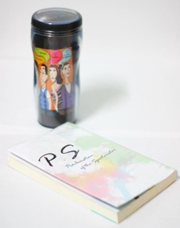English Prose 英文散文
Beauty, a Quest: Three Personal Examples from Literature
By Andrew Wu 吳柏德
I’ve always felt that experiencing beauty is relatively simple, for all it takes is a certain state of mind. The far more difficult goal, I believe, is fulfillment of beauty. From the simple to the sophisticated, across all mediums and dimensions, whenever I encounter beauty, I experience a panoply of hauntingly sublime feelings: joy, awe, and a longing to exceed and enhance myself. Over time, this is how I’ve come to define beauty and my relationship with it: a personal quest of being moved, humbled, and inspired into trying to fulfill a good larger than myself.
Growing up, one of my main sources of beauty came from reading. To this day, I can’t help but be incredibly moved and inspired when I read beautiful works. The following details three works of literature that came to me at different times in my life but have stayed and become part of who I strive to become. They are certainly not comprehensive, but they are essential. They have helped me in many times of need, and I’m certain they will continue to do so.
I met the first work at around the age of nine. I came across it in one of my mother’s books, and it was one of the first things of hers that I could almost fully understand. I loved it so much I copied it out with my nine-year-old handwriting, asked my mother to explain the hard words, and memorized it. I have long since lost my manuscript, but never have I lost the inspiration. Even now, I still quote it to myself often. This early and constant inspiration is Rudyard Kipling’s classic poem “If—.”
The poem uses a series of “ifs” that once fulfilled, give one “the world and everything that’s in it,” not to mention that one becomes “a man.” I felt at an early age that it elegantly articulates so many beautiful ideals and virtues. Since then, I have held myself up against these “ifs” as the high watermark of a strong and good character. Briefly put, these are the major qualities Kipling stresses: Stay calm during mass panic; trust in yourself; be patient; be courageous but stay humble; show constant respect toward others; maintain integrity even in dire circumstances; dream and think in moderation, and to the right ends; look beyond the facade of winning and losing; stand strong in adversity; always be kind; empower others; empower yourself; make every second count.
In countless moments of weakness and despair, I have brought Kipling’s lines back to remind myself to stay focused, to modify any flaws or errors, and to live life the right way. I feel that I am far from achieving this goal, but I still strive to do the best I can every day.
The second work is J. K. Rowling’s Harry Potter series, which I first read starting from age eleven and ending at eighteen. What I find most poetic is that this almost perfectly coincides with the years that Harry goes through in the series. In more ways than one, I grew up with Harry Potter, and I have always related to him and his friends. His adventures have served not just as exciting reading; they have taught me about life and death, courage and sacrifice, love and redemption. In addition, I’ve learned so much about the power of writing from Rowling, how inspiring and brilliant yet so difficult it is to plot and deliver a story that spans over 4,000 pages. Reading the Harry Potter series has constantly reminded me of the life lessons Rowling weaves, including (but far from limited to): Love is the most powerful force on earth; we are defined not by our abilities, but by our choices; courage is what one shows when one is at one’s weakest state death can be a new adventure; power corrupts; nobody’s perfect, but those that realize their weaknesses can get closer to it; a sense of humor goes a long way. Whenever I feel distraught or sad, Harry Potter always helps to lift my spirits and remind me of what’s important.
The third work, as I playfully claim, is the story of the first fictional girl I ever fell in love with: Sara Crewe in Frances Hodgson Burnett’s classic tale A Little Princess. At age seven, Sara is sent by her rich father, a single parent, to a boarding school in London, run by the formidable and cruel Miss Minchin. Being both brilliant and rich, Sara attracts the admiration of many and the jealousy of others, including that of Miss Minchin. Though privileged and loved, she is always polite and kind, even to those that many others despise. She holds herself up strictly to each and every standard expected of a princess. On her eleventh birthday, she learns that her father had died and becomes condemned to a life of slavery by Miss Minchin. Ultimately, Sara proves that fundamentally, it is not what one has but how one thinks and acts that makes one a true princess.
Sara has inspired me constantly, but no more especially than when I was eighteen, almost five years since my first reading of the novel. One day, on my way to school, a motorcycle ran a red light and shattered my knee. It took me almost a year before I could walk freely again, and the constant pain was devastating. What was worse, my life came to a halt, and thus my confidence was likewise shattered. Reading Sara’s story was one of the only things that helped to put things in perspective. I tried hard (like she did, though not as successfully) to stay positive and noble, to regain what I’d lost, and like Sara I have learned that the caprice of the gods might be part of life, but we can try to imagine better, and we will grow stronger because of it. Will, empathy and compassion were never strangers to me, but thanks to Sara’s beautiful story, I feel blessed knowing that I am much more capable of them than I could have ever imagined.
Years have past, yet every time I read or think about these works, I am temporarily lifted from the hustle and bustle of daily life, and I find myself better focus on what is most profound to me. Living a life inspired by beauty has become my personal quest, and by “beauty” I stand by my initial definition: I want to be in constant awe of the miracles of life and the grand accomplishments of others. I wish to aim to be more like the beautiful souls in real and fictional life, and forever be humbled by their greatness. These three works are just the tip of the iceberg of what I find inspiring and beautiful. Beauty can be found everywhere, and I know that my quest shall never end, but can be fulfilled in part through many shapes and forms, essentially, through work well done, time well spent, relationships well kept . . .
Beauty, a quest: The quest of life well lived.



